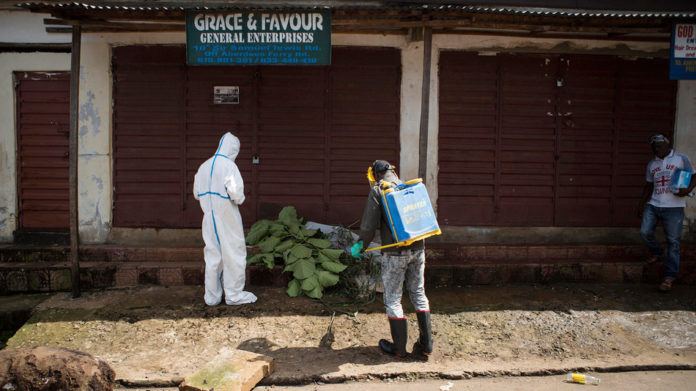WHO: Expect 10,000 New Ebola Cases per Week by December in West Africa

The Ebola virus continues to spread in parts of West Africa, and by December, health officials expect that there will be 5,000 to 10,000 new cases per week in Guinea, Liberia and Sierra Leone by Dec. 1, officials said Tuesday.
A top World Health Organization official said an earlier prediction of 20,000 total cases by November looks too conservative, and needs to be revised upward. Bruce Aylward, the assistant director-general of WHO’s humanitarian response division, made the remarks during a press briefing in Geneva, Switzerland, the headquarters of the World Health Organization, which is a United Nations agency.
The WHO added the disease is killing more people than initially reported, with a 70% fatality rate, an increase from the 50% fatality rate as previously believed.
Aylward told reporters that health workers are setting ambitious goals of seeing week-by-week declines in the number of new Ebola cases in Guinea, Liberia and Sierra Leone. They also are working to identify “all chains of Ebola transmissions” in those three countries within two months.
The WHO is pursuing the goals of having at least 70% of Ebola patient burials be safe, meaning they would have minimal risk of transmitting the disease, as well as having at least 70% of Ebola patients located in treatment facilities by Dec. 1.
Dr Aylward: By December 2014, 5,000 to 10,000 #Ebola cases per week anticipated in Guinea, Liberia, Sierra Leone
— WHO (@WHO) October 14, 2014
These are aggressive targets considering that the total number of Ebola cases have doubled about once every 30 days, Aylward said, and Sierra Leone and Liberia are in dire need of more beds for Ebola patients.
“It may continue to climb for a little bit in the early part of December,” Aylward said of the number of new cases. A slowdown in the number of new cases has taken place recently in parts of Sierra Leone, he said, but it’s not entirely clear if this is going to continue. Aylward said the geographic spread of the virus has expanded in recent weeks, which he called “concerning,” along with the escalating numbers in Liberian cities such as Monrovia.
In addition to updating its predictions for the total number of cases, the WHO also provided new numbers of cases and fatalities to date. As of Oct. 14, there have been 8,914 Ebola cases and 4,447 deaths have been reported to the agency. This is an increase from figures provided on Oct. 10, which showed about 8,400 cases and just more than 4,000 deaths. The new fatality totals include the death of an Ebola patient in Germany, as well as the two deaths in Spain and the U.S., respectively. “We will go over 9,000 cases this week,” Aylward said.
According to correspondence between Aylward and the Washington Post, the disease has been more lethal in West Africa than the numbers of cases and deaths would seem to indicate. He said Ebola virus disease is killing about 70% of those infected.
During the past three weeks or so, there has been an average of about 1,000 new cases per week, Aylward said, noting that this is not necessarily evidence that the outbreak is slowing or leveling off. “There’s a lot of data issues around them.”
Officials have to get the number of Ebola cases down to zero, since even a single case could start an outbreak. There is no such thing, he said, of an acceptable, low amount of Ebola.
“That’s like saying you’re only a little bit pregnant. This is Ebola. This is a horrible, unforgiving disease,” Aylward said. “You’ve got to get down to a level of zero.”
BONUS: The Ebola Outbreak: What You Need to Know
Have something to add to this story? Share it in the comments.
